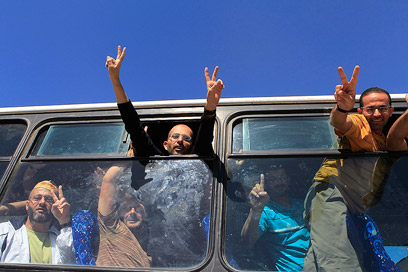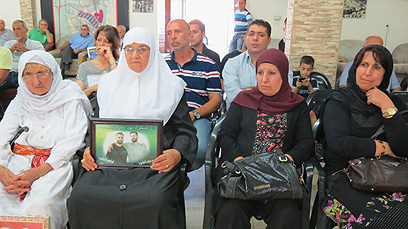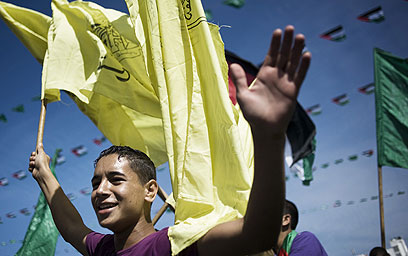The decision, the official said, hinged on whether Israel would confirm its intention to release Palestinian prisoners, as well as fulfilling the commitment allegedly made to US Secretary of State John Kerry that the first group of prisoners will be released during the first month of negotiations.
Related stories:
- Palestinian prisoners: We won't leave if there are manipulations
- Israel, Palestinians to launch talks Tuesday
- EU backs resumption of peace talks
According to the senior Palestinian source, the deal reached with the US is that Washington will send both the Israelis and the Palestinians an invitation to take part in negotiations which will be based on the 1967 borders and land swaps, and will include negotiations over all the core issues, including Jerusalem and the refugee issue.
The official further said that the negotiations were contingent on the release of 103 security prisoners from the time before the Oslo Accords. Now, he says, the Palestinians are awaiting the Israel governmental meeting this upcoming Sunday, in which the decision regarding their release will be officially decided.

Prisoners released during Shalit deal (Photo: Reuters)
According to him, if the Israeli government approves the prisoners' release and accepts Kerry's invitation, the Palestinians will come to negotiations next Tuesday in Washington.
However, if Israel does not release all of the 103 jailed Palestinians, including 24 Israeli Arabs and residents of east Jerusalem, Palestinians will not show up for talks, because, according to the official, they will not have the mandate of the Palestinian people.
The official added he believed there was a good chance that talks will resume and that Israel will release the prisoners in four stages, the last and final of which will be in six months time after talks in Washington commence; first and foremost because that was the agreement reached with Kerry.
It is worth noting that on Thursday Regional Development Minister Silvan Shalom said that he does not rule out the possibility that the release of Palestinian prisoners will take place before the Islamic holiday of Eid al-Fitr, which is marked in some two weeks time.
Arrested development
Meanwhile Thursday, the Society for Prisoners held a press conference in Baqa al-Gharbiyye together with the families of Israeli-Arabs held in Israeli prisons for security related offenses.

Families hold pictures of prisoner (Photo: Hassan Shaalan)
The participants slammed Palestinian President Mahmoud Abbas, insisting "He is neglecting Israeli-Arab prisoners. He is ignoring requests to have them included in the list of those to be released."
They further said that "the deal won't pass without the release of our boys," and said they were considering erecting a protest tent outside the Palestinian president's office.
In response, a Palestinian source said they were working to secure the release of all pro-Oslo prisoners, including those of Israeli nationality. Nonetheless, the families were not optimistic.
Assad Daka, a family member participating in the press conference, said: "According to the reports we are hearing, the Israeli-Arab prisoners are not included in the deal. We have received many promises from Abu Mazen (Abbas) and Palestinian officials, but they have yet to come true. This was just the way it was during the (Gilad) Shalit deal."
Home by Eid al-Fitr (Photo: AFP)
Despite Israeli reports regarding the beginning of peace negotiations, the US State Department has yet to confirm that talks will begin next week.
Deputy spokeswoman for the State Department, Mary Harp, said on Thursday that nothing has changed since Kerry announced the two sides will convene in Washington. She further noted that the department would supply a date for the beginning of the talks as soon as it was confirmed.
Harp refused to comment on the identity of the peace talk's expected mediator, rumored to be former US ambassador to Israel, Martin Indyk.
Kerry met with UN Sec. Gen. Ban Ki-Moon Thursday and said that: "Both Prime Minister Netanyahu and President Abbas have made a courageous decision to try to return to final status talks. And it’s my hope that that will be able to happen as procedures are put in place by both countries in order to empower that."
In the meantime, some 140 senior Jewish American figures have signed a letter addressed to Netanyahu expressing their support of the peace process as it is led by Kerry. Among those who signed the letter are former-US Senator Joe Lieberman, Former US Undersecretary of Defense Dov S. Zakheim and Alan Dershowitz.
Yitzhak Benhorin, Hassan Shaalan also contributed to this report
- Receive Ynetnews updates
directly to your desktop
















